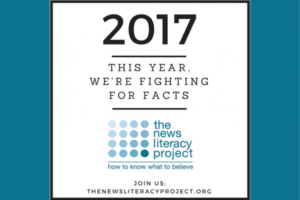Facebook to support the News Literacy Project on public service ad campaign
Facebook is supporting a public service advertising (PSA) campaign by the News Literacy Project (NLP) that will provide Facebook users with the tools to become informed consumers of news and information and to know which sources to trust, the company announced today.
 “As Facebook seeks to support journalism, we will also be working on new ways to help give people information so they can make smart choices about the news they read — and have meaningful conversations about what they care about,” Fidji Simo, Facebook’s director of product, wrote in a blog post.
“As Facebook seeks to support journalism, we will also be working on new ways to help give people information so they can make smart choices about the news they read — and have meaningful conversations about what they care about,” Fidji Simo, Facebook’s director of product, wrote in a blog post.
This effort is part of the Facebook Journalism Project, a broad initiative “designed to support quality journalism and news literacy” through partnerships with news outlets and nonprofit organizations. NLP is the only news literacy organization invited to participate.
The PSA campaign — which will include videos and other multimedia elements familiar to Facebook users — will raise awareness of the importance of being a skeptical and responsible consumer of news and information and will elevate the profile of the field of news literacy and of NLP and its programs. It will enable NLP, which to date has worked exclusively with students in middle school and high school, to extend its reach to the general public on a mass scale. Facebook has more than 1.8 billion active users worldwide.
NLP will use Facebook’s targeting capabilities to reach a wide range of users. This will allow NLP to build on the initial success of its classroom, after-school and e-learning programs, including its cutting-edge Checkology™ virtual classroom, an online platform that helps students discern fact from fiction through a range of exercises and video lessons led by prominent journalists and other experts.
“NLP welcomes the opportunity to work with Facebook to bring news literacy lessons and skills to an enormous and engaged audience,” said NLP President Alan C. Miller. “We look forward to providing Facebook users with the tools to recognize what information to trust and share and how to spot stories and posts based on false information, viral rumors and conspiracy theories.”
NLP will work with Facebook’s creative advertising team to develop the PSAs, which will appear exclusively on the social media platform during an eight-week period this spring. Facebook has retained Scot Safon, the former chief marketing officer at CNN Worldwide, to collaborate on these messages with NLP, which will have final editorial control over the content.
NLP teaches that all information is not created equal and uses the aspirational standards of quality journalism to determine what should be trusted, shared and acted on. It also fosters an understanding of the importance of the First Amendment and a free press in a democracy. NLP’s primary mission is to provide programs and resources that teach secondary school students how to differentiate credible information from raw information, misinformation and propaganda in the digital age.
In Facebook’s blog post, Simo said that the company “will work with third-party organizations on how to better understand and to promote news literacy both on and off our platform to help people in our community have the information they need to make decisions about which sources to trust. We will help organizations already doing important work in this area, such as the News Literacy Project, and bring a consortium of experts together to help decide on what new research to conduct and projects to fund.”
In addition to making a financial donation to support NLP, Facebook is providing engineering assistance from its partnership team to help NLP determine how to develop an app that will effectively support its educational work, which will remain independent of Facebook.
Facebook also said that it will expand training for journalists and will partner with news organizations to develop new storytelling formats, support local news and find ways to encourage its users to subscribe to news outlets.
The Facebook Journalism Project is the company’s second major step to address hoaxes and fake news since coming under criticism for the use of its platform as a means of spreading factually inaccurate and outright false stories during the presidential election. The company announced last month that it was making it easier for users to report suspicious posts and reducing the financial incentives for those who create hoaxes. It also launched a program in collaboration with the Poynter Institute to give independent fact-checking organizations the ability to flag suspect Facebook posts.
The News Literacy Project, a national education nonprofit, was founded in 2008 by Miller, who won the Pulitzer Prize for National Reporting in 2003 as an investigative reporter with the Los Angeles Times. NLP has delivered innovative classroom, after-school and digital programs to diverse and dynamic schools in New York City, Chicago, Houston and the Washington, D.C., area since 2009.
In May, it launched the Checkology™ virtual classroom, which is the culmination of all its work to date and its primary path to national scale. This e-learning platform, available anywhere there is an internet connection, provides students with engaging, real-world lessons that foster critical thinking skills. Leading journalists from The New York Times, The Wall Street Journal, The Washington Post, NBC News, Bloomberg and the Chicago Sun-Times are joined by experts on the First Amendment and digital media as virtual teachers and video-based guides throughout the core lessons.
More than 2,000 educators who teach more than 220,000 students in all 50 states and the District of Columbia have registered to use the platform.
